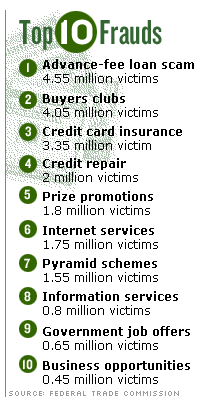NEW YORK (CNN/Money) - More than one in 10 Americans were the victims of fraud between May 2003 and May 2004, according to a government survey released Thursday, with fees paid for "guaranteed" loans or credit cards the most common scam.
The Federal Trade Commission's first survey of consumer fraud found that nearly 25 million adults in the U.S., or 11.2 percent of the adult population, were victims of fraud, and that certain racial and ethnic minorities more often fell prey to fraudulent schemes.
"We found that American Indians and Alaska Natives, African Americans and Hispanics are more likely to be victims of fraud than non-Hispanic whites," said Howard Beales, Director of the FTC Bureau of Consumer Protection, in a statement.
The survey found that American Indians were more likely to be victims than anyone else, with nearly 34 percent of the demographic group having been the victim of one or more scams in the preceding year, according to the survey.
Seventeen percent of African Americans fell prey to fraud and more than 14 percent of Hispanics were victims, said the survey. For non-Hispanic white Americans, more than 6 percent of them had been victims of fraud in the year.
"The results of our survey indicate that fraud in the U.S. is a serious problem," Beales said in a conference call.
"One way scam artists succeed is to target a population that's not very financially savvy -- whether because they've recently moved to the country or they just aren't familiar with dealing with banking or credit card business," said Joe Ridout, consumer services manager at Consumer Action.
Gail Hillebrand, senior attorney with the Consumers Union's west coast office, said the findings on race showed, "a strong need in the U.S. for earlier, better and more in-depth financial education for everyone."
Debt, scam connection
The survey of 2,500 randomly chosen consumers found that people deep in debt were more likely to be victims of fraud. Little surprise then that three of the top four categories of fraud are related to credit, including credit-repair scams.

Advance-fee loan scams were the most frequently reported type of consumer fraud, whereby consumers pay a fee for a "guaranteed" loan or credit card, said the report. Four and a half million people – 2.1 percent of adults – paid fees and received nothing in return. Some people paid advance fees more than once.
"This suggests the burden of debt has had adverse consequences beyond what we had previously imagined," said Hillebrand, noting that these scams were designed to victimize people already in over their heads, desperate for a way out of overwhelming circumstances.
The survey showed that people with high levels of debt were three times more likely to be victims of credit fraud scams. The average amount of credit card debt for households with a card balance is $9,000. That means many Americans are both in over their heads and at risk of losing even more money to fraud.
"This isn't only about fraud. It's also about how mainstream financial institutions encourage high levels of debt," said Hillebrand, creating a population of desperate consumers who make easy targets for scam artists.
In another appeal to a person with bad credit, many scam artists say they can remove truthful, negative information from credit reports or establish new credit records. They can't; even so, the study found that two million had paid for "credit repair."
The survey also revealed that 33 percent of fraud victims found out about scams through print advertising in newspapers, magazines, direct mail and catalogs. Another 17 percent of the time, scam artists made first contact via telemarketing, and only 14 percent of scams were offered on the Internet. Television or radio advertising accounted for the remaining 10.6 percent of fraudulent offers.
Consumers between the ages of 25 and 44 were most likely to be victims, the survey said. Almost 75 percent of consumers under the age of 35 complained, while only 55.4 percent of consumers between 55 and 64 fought back.
It is essential that people be aware of fraud and take action to protect themselves, said Ridout, adding that consumers should always protect their personal information and not hesitate to demand identification or contact the Better Business Bureau to check out a company.
Because, said Ridout, "if an offer seems too good to be true, it is."

|

